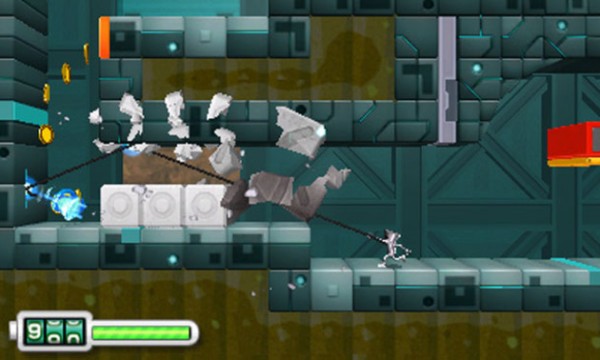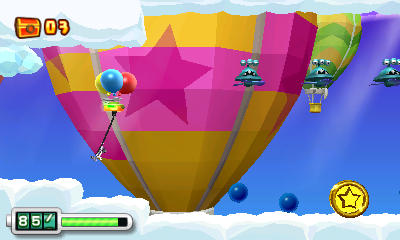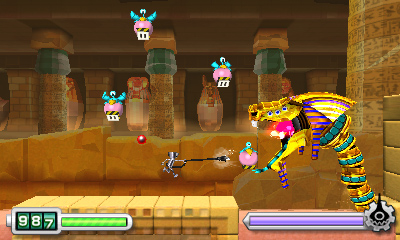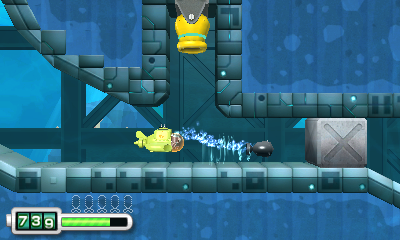Publisher: Nintendo
Developer: Nintendo
Medium: 3DS Card
Players: 1
Online: No
ESRB: E
Of all the Nintendo series which have seen a revisitation or spinoff recently, Chibi Robo! Zip-Lash seems like the odd duck of the group. Originally a Gamecube game about a tiny robot who spends his time cleaning up messy apartments and such, Zip-Lash returns in the form of a 2.5D action platformer with some light puzzles in the mix. It’s certainly a less niche gameplay model, but like many, I was curious about how the series has decided to gorw since the Nintendo DS game.
Turns out that Chibi-Robo still has his trusty cable, ready for action. That, and maybe some cleaning along the way.
It’s also Chibi-Robo’s debut on the 3DS, which takes the already basic visuals of Chibi-Robo and seems to boil them down a little more to suit the system’s abilities. There’s a lot happening for the little robot, between a genre change, the new hardware, and a new story as well. It almost feels like a reimagining of the series, or at least an effort to try something new with a character Nintendo clearly has a great amount of affection for (going so far as to provide the little guy with in-game costumes and giving him his own amiibo).
As far as the gameplay is concerned, it’s actually pretty snappy. This may not come as a surprise to anyone familiar with Nintendo’s eye for tight mechanics and a high amount of polish and design, but there’s a solid game at Zip-Lash’s core. Most of the movement is a lot of jumping and running from left to right, with the ability to attack using Chibi-Robo’s cable, but levels are scattered with small extension pieces which will allow him to use his Zip Lash ability, charging up a long toss toward far-away enemies or grapple points.
In certain instances, it reminds me of other games where swinging around was a big deal, like using Batman’s grappling hook on an old Gameboy title, but the Zip-Lash ability is a multipurpose one. For instance, it is a more powerful way of breaking down obstacles, and in others will dispatch enemies in a single shot instead of hitting them several times with a regular attack. There’s also some geometry that comes into play, as Chibi Robo’s cable can be ricocheted off hard surfaces in order to reach hidden or distant areas.
While the Zip Lash concept has a solid foundation, the amount of time it takes to charge up the move seems to be about twice as long as necessary. Game sections are designed around this, which leads to some exciting points where I was hoping the Zip Lash would be ready before taking a fall, but in general play, it felt tedious to wait for the Zip Lash to charge a couple seconds. There also happened to be a couple points where using the cable to fly up from ledges and grapple onto more complicated areas really seemed to tap into the potential it could present as a more engaging means of moving around the world. I was disappointed to find these more fun areas to be rare throughout the game.
This turned out to be my overall issue with Chibi-Robo! Zip Lash, in that it ultimately doesn’t reach its full potential. There are times where it scratches the surface of being a game that stands on its own two feet, but it’s mostly a very “safe” game in its design. That’s not to say that the design is boring, but the invention in Mario platformers, and even the Captain Toad spinoff game, was nowhere to be found here. Instead, gameplay mechanics that Chibi-Robo uses seem to be borrowed from more successful Nintendo series. Rolling around reminds me of Metroid, but feels nimble like Donkey Kong, although it resembles neither due to a lack of overall momentum and precision. Aiming Chibi-Robo’s cable is reminiscent of throwing eggs as Yoshi, and the grappling hook mechanics can be attributed to a variety of games — you decide which one.
The level design also feels uninspired, but all of these issues are minor complaints when there are even stranger choices in the game’s progression. Rather than naturally going through levels in their numbered order, players are dragged through a roulette wheel of 1-3 which determines how far around a circuit they’ll move. This means that if you’ve just played Stage 2-2 and hit a panel with 2 moves, then you’ll be playing 2-4. Sounds cool, until it becomes apparent that you’re required to play each stage once before a boss fight and being allowed to move to the next world.
Oddly, once the worlds are complete, players are allowed to select levels at their own choosing. it sort of undermines whatever game there is in skipping ahead (only to replay levels you’ve already seen before, if needing to circle back around). I’m not sure what the point of this minigame was, as the only purpose it truly serves is to waste player’s time if they’re trying to see everything once and explore at their leisure after the fact. It was, if anything, the worst part of my experience in Zip Lash, followed closely by the painfully mandatory cutscenes and dialog between actually playing the levels. Players will be hoping to skip the brief animations and chatter after going through it a couple times, but the game has no option to speed up text or to skip the same ship landing sequence that you’ll have seen at least 42 times by the end of the game.
All things considered, the actual gameplay is light and, if only for a bit, interesting. Chibi-Robo! Zip Lash’s visuals and audio are both some of Nintendo’s lesser work, notably the music which seems to have no interest in keeping players engaged. It could be due to a small team, or simply the nature of how things went when developing for the 3DS, but both audio and visual aspects were underwhelming. Ironically, Chibi-Robo himself (along with creatures and bad guys) has the same top-notch animation that Nintendo has become well-known for. It’s too bad that the bland worlds he’s exploring aren’t doing anything to support how energetic he is.
One other thing to note is that at least once in each world, players get an on-rails level that involves riding a skateboard, being in a submarine, or some other vehicle to mix up all the running and jumping. Aside from the minecart-style levels, these are the clunkiest sections in the entire game. I’m not sure what’s fun about the excruciating weight of moving a submarine from one point to another, but it’s not clear that Chibi-Robo! Zip lash had a great idea, either. Luckily, these sections are few and far enough between that I nearly forgot to mention them if not for referring to my notes from playing the game, but it’s essential in detailing the sort of things that drag down what could have been a much stronger game.
I’m glad to see Nintendo experimenting with their IP, but with Chibi-Robo! Zip Lash, we’re left with a game that someone didn’t seem to want to commit to. If I were playing at my own pace, I may have given up or taken a lot longer to see the entire game in part due to the unskippable transitions and dialog, along with all the formalities between scoring and choosing the next destination, which is a shame because the core game has a lot to offer. I mean that on two levels, as it’s a solid action platformer, but it also has a lot of untapped potential that players may be disappointed to discover by the time they’re through. Granted, that’s 10-12 hours later at least, but it’s a fine 10-12 hours of no-stress gameplay (with a little cleaning up on the side, as well).






